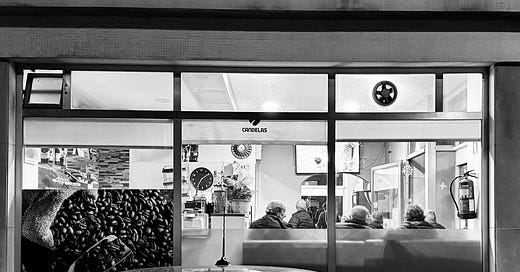My husband Jim and I had rented an unfurnished apartment in a high-rise months before we were to arrive in Porto. Since we were bringing my disabled sister Lynne to live with us, the apartment needed to be furnished with the essentials. I made plans to spend two weeks in Porto. My mission was to make the apartment liveable for my husband and me, my sister, and a caregiver. Finding an agency and hiring a caregiver was also on my to-do list.
Upon arriving at the high-rise, I noticed a small café on the ground level. A cup of coffee sounded good, so I went in. There were about half a dozen people sitting at small tables and a man in his fifties operating the espresso maker, taking and fulfilling all of the orders. This was the owner, Luis. I ordered a coffee in my poorly spoken Portuguese. Luis asked where I was from. “Estados Unidos.” I told him that my husband, sister and I were moving to Portugal in August. “Portugal is the best place to live! It’s safe here and the people are very good. If there is anything you need, you tell me.”
During the next two weeks, I frequently stopped in for coffee and chatted with Luis. He always ended our brief conversations with, “If you need anything, you tell me.” I found this very comforting, given that I didn’t know anyone in Porto. As the weeks went by, I noticed that Luis treated his other customers with a similar level of kindness. There were the construction workers on break, a security guard, the building manager, a professionally dressed woman, and teens from the nearby school. Then there were the regulars who came in the evening. These were mostly men who lived or worked nearby and came to watch the news together, or a football game (or soccer as it’s called in the Estados Unidos). Luis was nearly always there; sometimes joined by his wife Maria or one of his sons. He did close on Sunday afternoons, as Sundays are traditionally spent with family.
Now that my husband and I have lived here for eighteen months, I’ve gotten to appreciate the café as a sort of living room for the neighborhood. In planning terms, the café is a “third place”. Not home. Not work. It’s a place you can go to hang out for a while, see people you know, and check in with what’s going on in your part of the world. But Luis adds something special. He cares about the people who come into the café. He checks in on how people are doing. He looks directly into your eyes and asks, “Everything okay? You tell me if you need anything.”
One day, the shop was closed. I asked the building manager, Senhor Reis, what had happened. “Luis is in hospital.” It was so strange to see the place closed, with no one stopping in or hanging around. Eerily quiet.
The next day, the shop was open, with Luis back at the espresso maker. I came in and asked if he was okay. “Yes, the doctor says everything will be fine.” I commented that he was sorely missed. “Yes, I know! My cell phone…so many people called me to see if I was okay, that I ran out of minutes!” Apparently, Luis has a prepaid cellphone and whatever money he had paid upfront, all had been spent talking to his well wishers.
Last Saturday, I came to Luis’ café to deliver the remainder of a birthday cake that had arrived as a gift from a dear friend back in Colorado. It was mid-afternoon and there were no other customers in the café. He asked if I had ever had a fruit drink made with passion fruit. I had not. He took a can out of the glass case and gave it to me. No charge. We talked for a few minutes about the latest news from the U.S. and then I asked how his granddaughter Aurora was doing. He took out his cell phone and showed me a picture of Aurora with her dad, Luis’ son. “She’s two months old now. So beautiful!” I told Luis that I thought he had a beautiful life. Luis then shared with me a story of his childhood. “I grew up with only my grandmother. No mother. No father. Just my grandmother. I worked many, many hours when I was young and didn’t have time for my friends. But now, I have this café and I have many friends. I have my family who I love very much. If someone needs something, I can help them. My family and my friends are the most important things in my life.” I began to think about how amazing it was that Luis was able to take the loneliness of his childhood and transform it into a practice of caring and kindness.
There are cafés in many of the residential buildings in Portugal. Cafés that serve as the “living rooms” of countless neighborhoods, where people can stop in, see familiar faces, watch a sports game together, and catch up on the local news. But a stranger from another country was made to feel welcome by a kind café owner who still says to me, “If there is anything you need, tell me.”



